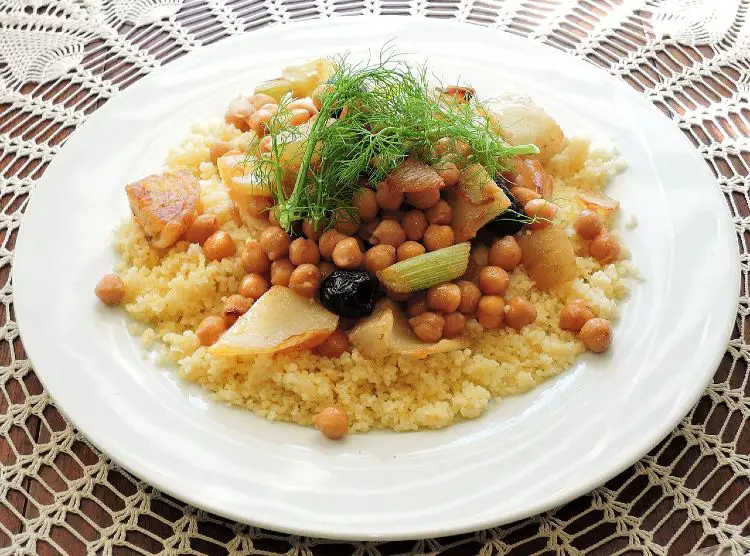Can You Freeze Couscous?
At first glance, couscous can look as plain and uninteresting as rice. But, the moment you garnish it with lemon juice, garlic, salt, and edible oil, it transforms into an exciting side dish that looks tasty and inviting. It is similar to rice because you can combine it with vegan and non-vegetarian food items to convert it into a full-fledged meal.
Like every food, you can have concerns about preserving couscous leftovers for another day. However, that should not be a problem because you can freeze couscous, like freezing other cereals, grains, or pasta. Then, you can reheat the frozen couscous and have it any time.
Can You Freeze Couscous?
So, to answer the question, can you freeze couscous? Yes, you can.
However, we advise you to follow the specific procedure to get the best out of your frozen couscous.
How Do You Freeze Couscous?
You can prepare couscous in various ways. It is an essential part of Moroccan, Israeli, and Lebanese cuisine. Though the preparation methods in each of these cuisines are different, the freezing procedure is the same. The prime aspect to note when freezing couscous is to ensure it is free from contamination. Otherwise, it can become a sizeable frozen block that can become mushy after reheating.
We suggest following the steps described here to freeze couscous.
- If you are freezing leftover couscous, the first thing to do is separate it from the other foods that could have been mixed. It ensures that the different foods do not freeze, interfere with the couscous freezing procedure, and affect its consistency. You can skip this part of the freezing procedure if you are freezing freshly made couscous.
- Your couscous can be warm. So, we advise you to cool it to room temperature. Freezing warm or hot couscous can do more harm to it than good. The moisture rising from the warm couscous can freeze and create a block of frozen couscous that can be challenging to reheat.
You can hasten the cooling by placing the warm couscous in a sealed container and keeping it in a vessel containing cold water. However, we do not recommend rinsing the couscous container with running water as this water can freeze inside the freezer to cause a massive block of couscous.
- Once the couscous has cooled down to room temperature, you can start the freezing process. It is better to take a large baking sheet or plate and spread the couscous over it in an even layer. You can use an additional baking sheet if you have a sufficiently large batch for freezing.
This process prevents the clumping of couscous during the freezing process. As a result, the defrosted couscous does not turn mushy on heating.
- Transfer the baking plate to the freezer and freeze the couscous.
- Once frozen, you can remove the baking tray from the freezer and transfer the frozen couscous into a freezer-safe ziplock bag. A plastic airtight container is also ideal for freezing couscous.
- Press the ziplock bag gently to allow the excess air to escape. Seal the bags and stick the date label on them before placing the bags/containers into the freezer.
Compared to the ziplock bag, an airtight container is preferable because the chances of an airlock in the airtight container are less.
How Long Can You Freeze The Couscous To Maintain Its Freshness And Taste?
Frozen couscous can remain delicious and not lose its flavor for three to four months after freezing correctly. However, we recommend that you reheat the couscous and consume it within these three months.
How Do You Defrost The Frozen Couscous?
The primary objective of freezing couscous is to ensure they remain fresh for consumption later. Therefore, defrosting couscous is essential. It is possible to defrost couscous in two ways.
In The Microwave
Defrosting the frozen couscous in a microwave is the best and foolproof method. Besides, it is the quickest mode of defrosting and reheating couscous.
- Transfer the frozen couscous from the freezer to a microwave-safe bowl and add a couple of tablespoons of water.
- Microwave the couscous one minute at a time on high heat. We advise you to shake it a bit using a fork at the end of every minute.
- You know the couscous has reheated thoroughly when you see steam coming out.
On The Hob
Not everyone is comfortable with the microwave. So, if you do not have one or do not wish to microwave, the hob defrosting mode is ideal.
- Place a saucepan on the hob and heat some oil and a couple of tablespoons of water.
- Add the frozen couscous to the saucepan and heat it until it absorbs the water.
- Please switch off the hob and remove the saucepan from it. Use a fork to fluff the grains and confirm whether they have appropriately reheated.
Can You Refreeze Couscous?
We never advise refreezing couscous because the changes to its texture can be dramatic. It can become soft and mushy. So, if you freeze a large batch of couscous, there can be wastage. A better alternative is to divide the couscous into smaller consumable portions before freezing.
Can You Freeze Couscous Salad?
It is possible to freeze couscous salad. However, the process is challenging because all ingredients do not freeze equally.
Can You Freeze Couscous For Babies?
Couscous is an excellent baby food they can consume after six months. You can freeze couscous for babies, but we advise you to follow the procedure correctly.
Can You Freeze Couscous Once Cooked?
It is possible to freeze cooked couscous and keep it frozen for four months in its dried form.
Can You Freeze Cooked Couscous With Vegetables?
We do not advise freezing cooked couscous with vegetables because the veggies can become soggy when defrosted. In addition, it can affect the couscous. The ideal solution is to freeze them separately.
Can You Freeze Couscous In Soup?
Yes, it is possible to freeze couscous in soup.
Can You Freeze Couscous Meals?
You can freeze couscous meals and maintain their taste and flavor for three months.
Final Thoughts
Couscous is an excellent treat as you can prepare it in different ways using multiple combinations. Freezing cooked couscous lets you maintain its nutrients and enjoy the taste as if freshly made.
So, can you freeze couscous? Of course, you can, but it is better to follow the correct procedure.



